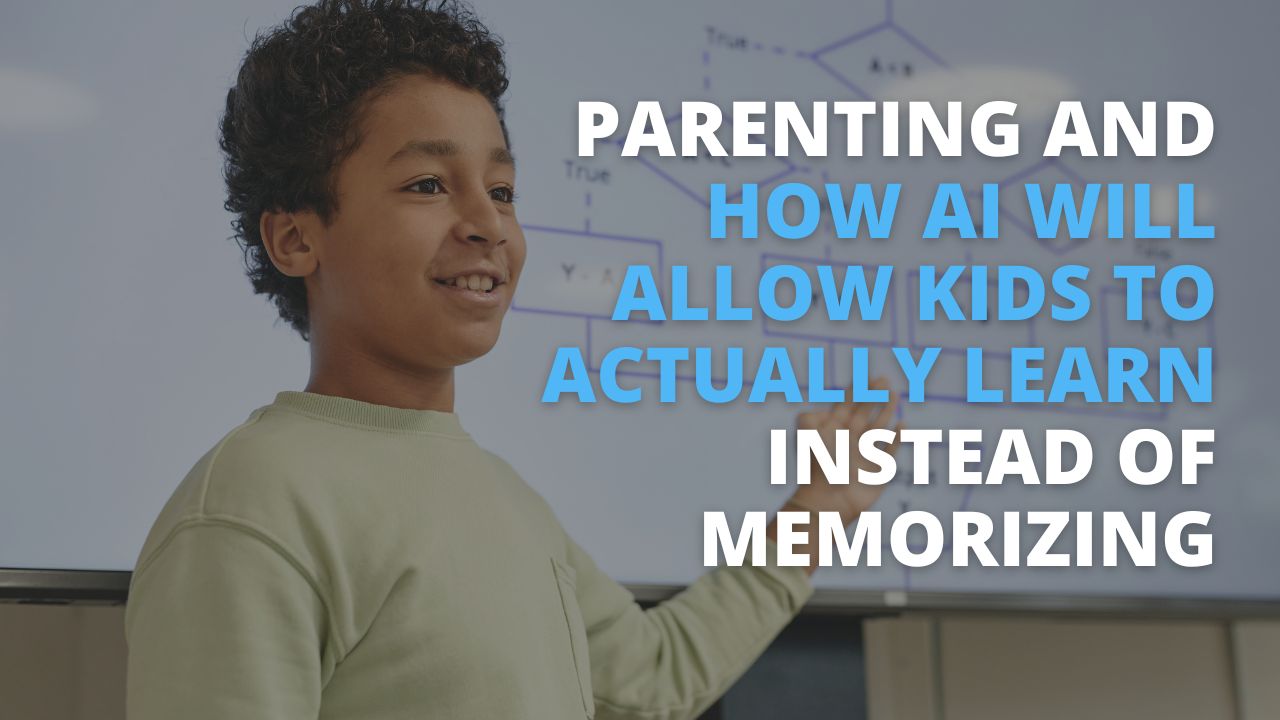Parenting and education are two crucial aspects of a child’s life that shape their growth and development. The right kind of parenting can lay the foundation for a successful future, while proper education can help them build knowledge and hone their skills.
As such, both parenting and education have always been a critical concern for parents, educators, and policymakers alike. In recent years, however, Artificial Intelligence (AI) has emerged as a technology that has the potential to change how we think about education.
AI refers to machines capable of performing tasks typically done by humans – such as learning, decision-making, and perception – without needing explicit instructions every time they do it. AI is being used in numerous fields today – from healthcare to finance – but one area where it is expected to make the most significant impact is education.
I want to note that I am a new father to a beautiful 1.5 year (2022). Although she is not in a traditional education school program yet apart from swimming lessons and music class I do have my reservations about how school will look here in 2027. This is a subject I will be diving into deeper to get a better understanding to be able to better help my daughter when she starts in an AI era of schooling.
Table of Contents
The Potential Impact of AI Technology on Education

The impact of AI on education could be enormous. With AI-powered systems, educators would be able to create personalized learning experiences tailored to each student’s unique needs.
This could include analyzing data generated by various sensors (such as eye-tracking or brainwave analysis), predicting student behavior patterns based on past performance data, and using natural language processing (NLP) to analyze written work or speech patterns. Additionally, by using chatbots or virtual assistants powered by AI technology, students could receive automated feedback on their work whenever they needed it instead of waiting until their next meeting with an educator or tutor.
These systems could also provide students with additional resources like videos or articles related to areas where they may be struggling. By doing so, these systems would promote active rather than passive learning—allowing kids to learn in ways that are more effective for them while engaging them more deeply in the process.
The Problem with Traditional Education Methods

As a civilization, we progress year after year, century after century bu the one thing that remains the same and is one of the last progressive systems to change is the education system. Well, with the new advancement in ai that is changing. Let’s look at some of the flawed approaches to our children’s education.
Memorization-based Learning: A Flawed Approach
For many years, the traditional approach to education has been centered around memorization-based learning. Students are expected to memorize information quickly and accurately, rather than truly understanding the concepts behind them.
This approach fails to provide students with the necessary critical thinking skills that they need to succeed in the real world. Because education is often seen as a competition, students often feel pressured to simply memorize information for exams and tests, rather than actually understanding it.
This approach may work in the short term, but it leaves students ill-equipped for the future. It’s like building a house on sand – once you take away the support of rote memorization, everything falls apart.
Examples of Failed Memorization-Based Learning
There are many examples of how this approach has failed in past educational systems. Many countries have fallen behind when it comes to global educational rankings because they have focused too heavily on rote memorization instead of encouraging critical thinking skills. In China, for example, there are stories of students spending up to 16 hours per day studying in order to achieve high scores on standardized tests.
While these scores may be impressive at first glance, they do not necessarily reflect true understanding or intellectual curiosity. Similarly, in Japan’s educational system, students are expected to memorize entire textbooks before taking exams – a process that is not only time-consuming but also discourages independent thought.
Overall, traditional education methods centered around memorization-based learning fail to truly educate and prepare children for life beyond school walls. Fortunately, AI technology can help revolutionize education and create more personalized learning experiences that catered towards individual needs and interests
How AI can change the game
We have discussed the flawed ways of teaching and the reason why they need to change, but now let’s look at how ai education technology with bring new advancement and learning experiences to our children.
Personalizing learning experiences with AI technology
Artificial intelligence has the potential to revolutionize education by tailoring learning experiences to each individual student. With traditional teaching methods, all students in a classroom are typically taught the same way and at the same pace. However, every child learns differently and at their own pace, which can lead to some students falling behind or becoming disengaged.
AI technology can personalize learning experiences by analyzing each student’s learning style, strengths, weaknesses, and interests. This information is used to create a customized curriculum that adapts in real-time based on how well each student is understanding the material.
This means that students who need more time and help with a certain concept get it while those who already understand it move on to more challenging material. By personalizing learning experiences through AI technology, students are able to truly understand concepts instead of just memorizing them.
Real understanding vs just memorization
Memorization-based teaching methods have been criticized for not encouraging critical thinking skills or a true understanding of concepts. When students simply memorize information for exams without actually understanding it, they may forget what they’ve learned shortly after the exam is over.
However, with AI technology that personalizes learning experiences for each student based on their individual needs and interests, they are able to develop a deeper understanding of concepts through interactive lessons that engage them in ways traditional educational methods may not be capable of doing. By using AI technology in education, we can help children learn in ways that work best for them individually while allowing them to build strong foundations of knowledge through deeper comprehension instead of merely memorization.
The benefits for parents and educators

AI technology can assist parents and educators in identifying areas where a child may be struggling or excelling
One of the biggest benefits of AI technology in education is the ability to track a student’s progress closely. By analyzing data on a student’s performance, AI algorithms can identify areas where the student may be struggling or excelling.
This information can be incredibly valuable to both parents and teachers. For parents, this information can help them better understand their child’s strengths and weaknesses.
They can use this knowledge to provide additional support at home or work with their child’s teacher to create personalized learning plans. For teachers, this information can help them tailor their teaching methods to better suit each individual student.
Discussion on how this information can be used to create personalized learning plans that cater to each child’s unique needs
Once AI algorithms have identified areas where a student may be struggling, they can use this information to create personalized learning plans that cater specifically to that student’s unique needs. These learning plans may include additional resources or activities that target the specific concepts the student is struggling with. In addition, AI technology allows for real-time feedback that helps students understand their progress as they go along.
This helps students feel more engaged in their own learning process and encourages them to take an active role in their education. Overall, AI technology has the potential to revolutionize education by allowing for more personalized instruction tailored specifically for each individual student.
By analyzing data on a student’s performance, AI algorithms provide valuable insights into how each child learns best and what areas need extra attention. With these insights, parents and educators are empowered with tools necessary for creating effective personalized learning plans that will help children thrive academically and mentally as well!
The Potential Drawbacks
Privacy and Data Protection Concerns
While AI technology has the potential to revolutionize the way we approach education, there are valid concerns regarding privacy and data protection. AI technology relies on collecting data from individuals to personalize learning experiences, which can result in the storage of sensitive personal information. There is a risk that this information could be misused or accessed by unauthorized individuals if adequate safeguards are not put in place.
To address these concerns, it is essential that parents and educators work together to ensure that proper guidelines are established for the collection, storage, and use of student data. This includes measures such as limiting access to sensitive information only to those who need it, providing clear explanations on how data will be used and stored, and implementing secure systems for storing personal information.
The Role of Human Interaction in Education
Another concern with AI-based education is that it may lead to a decrease in human interaction between students and teachers. While AI technology can provide personalized learning experiences based on each individual’s needs, it cannot replace the value of face-to-face interactions with educators. It is important for parents and educators alike to recognize the importance of human interaction in education.
This includes developing strategies for incorporating meaningful interactions into personalized learning plans that make use of AI technology. Examples include setting aside time for one-on-one sessions with teachers or group discussions among students.
Possible Solutions
To address these potential drawbacks associated with AI-based education, there are several possible solutions that can be implemented. Firstly, policies must be put into place by schools or educational institutions to ensure that privacy rights are maintained throughout all stages of learning using AI-based approaches. Moreover, human intervention should always play a crucial role in education as educators understand how their students learn better than any algorithm ever will.
With proper training in using artificial intelligence tools effectively alongside traditional teaching methods, teachers can integrate the benefits of AI while maintaining the human touch that is so essential to effective education. Overall, with proper regulation and a focus on retaining the role of human interaction, AI technology has immense potential to revolutionize education and provide truly personalized learning experiences for each individual student.
Conclusion
AI technology has the potential to revolutionize the way we approach education and parenting. By utilizing personalized learning experiences, students will have a better understanding of concepts and critical thinking skills. AI technology can assist educators in identifying areas where a child may need extra help or be excelling, which can then be used to create tailor-made learning plans that cater to each child’s unique needs.
Parents and educators alike stand to benefit from this technology. With access to valuable data on student performance and engagement levels, parents will be able to better understand their children’s progress and work closely with their teachers towards meeting their academic goals.
As for educators, they’ll have more time to focus on developing meaningful relationships with their students instead of grading papers or teaching material that is not relevant. Overall, the future of education with AI looks bright.
While there are valid concerns regarding privacy and data protection, it is important to remember that technology is constantly evolving, and we should embrace the benefits it brings along with it. With AI technology in hand, parents and educators alike can work together towards creating a brighter future for our children—one where education isn’t just about memorizing information but truly understanding it.
